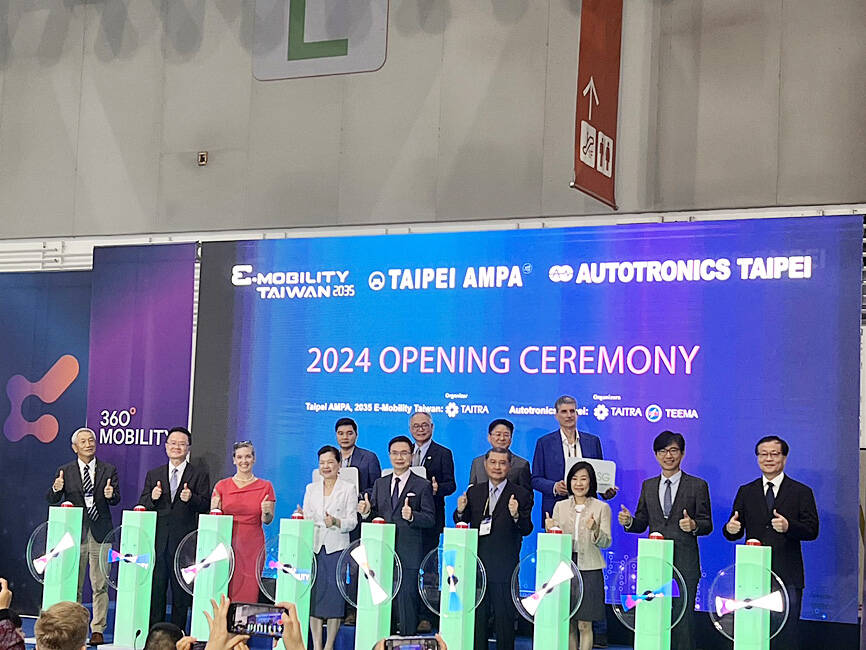The Taipei International Auto Parts and Accessories Show (Taipei AMPA), the Taipei International Automobile Electronics Show (Autotronics Taipei) and the 2035 E-Mobility Taiwan exhibition jointly opened yesterday at the Taipei Nangang Exhibition Center’s Hall 1, featuring electric vehicles along with components and assemblies.
The three trade shows have drawn about 1,000 domestic and foreign exhibitors from 19 countries, the Taiwan External Trade Development Council (TAITRA, 外貿協會) said in a statement.
Themed “360° Mobility,” the exhibitions are aimed at highlighting the automobile, motorcycle and smart mobility ecosystem, and offering a platform for potential buyers and exhibitors to connect, event organizers said in the statement.

Photo: Lin Jin-hua, Taipei Times
One of the featured exhibitors is Hon Hai Precision Industry Co (鴻海精密), which is showcasing its new Model N electric cargo van prototype and the Model B personalized urban car, as well as components and parts used in the power systems of its Model T commercial bus model.
Shihlin Electric & Engineering Corp (士林電機), Pacific Electric Wire and Cable Co (太平洋電線電纜) and Texas Instruments Inc are featuring their power systems for electric vehicles.
Shihlin Electric is displaying two powertrain systems for electric vehicles for commercial logistics use and a four-in-one e-bike system.
One of the powertrains is a two-in-one system that has maximum power of 150 kilowatts (kW), enough for 5 tonne logistics vehicles, while the other is a new 13kW powertrain system used for three-wheel logistics vehicles, the company said.
Also at the event, Master Transportation Bus Manufacturing (成運汽車) is unveiling its self-developed direct-drive central motor, which can achieve peak power of 450kW, and an electric bus equipped with 218 kilowatt hours of battery capacity.
Master Transportation chairman Wu Ding-fa (吳定發) said the motor would be available from the second half of this year.
Other companies displaying their products at the shows, which run until Saturday, include aftermarket lighting supplier Coplus Inc (巨鎧精密), and vehicle parts and accessories suppliers Tong Yang Group (東陽集團), Depo Auto Parts Industrial Co (帝寶工業) and TW Racing Parts Inc (琦玉國際).

ADVERSARIES: The new list includes 11 entities in China and one in Taiwan, which is a local branch of Chinese cloud computing firm Inspur Group The US added dozens of entities to a trade blacklist on Tuesday, the US Department of Commerce said, in part to disrupt Beijing’s artificial intelligence (AI) and advanced computing capabilities. The action affects 80 entities from countries including China, the United Arab Emirates and Iran, with the commerce department citing their “activities contrary to US national security and foreign policy.” Those added to the “entity list” are restricted from obtaining US items and technologies without government authorization. “We will not allow adversaries to exploit American technology to bolster their own militaries and threaten American lives,” US Secretary of Commerce Howard Lutnick said. The entities

‘SWASTICAR’: Tesla CEO Elon Musk’s close association with Donald Trump has prompted opponents to brand him a ‘Nazi’ and resulted in a dramatic drop in sales Demonstrators descended on Tesla Inc dealerships across the US, and in Europe and Canada on Saturday to protest company chief Elon Musk, who has amassed extraordinary power as a top adviser to US President Donald Trump. Waving signs with messages such as “Musk is stealing our money” and “Reclaim our country,” the protests largely took place peacefully following fiery episodes of vandalism on Tesla vehicles, dealerships and other facilities in recent weeks that US officials have denounced as terrorism. Hundreds rallied on Saturday outside the Tesla dealership in Manhattan. Some blasted Musk, the world’s richest man, while others demanded the shuttering of his

Minister of Finance Chuang Tsui-yun (莊翠雲) yesterday told lawmakers that she “would not speculate,” but a “response plan” has been prepared in case Taiwan is targeted by US President Donald Trump’s reciprocal tariffs, which are to be announced on Wednesday next week. The Trump administration, including US Secretary of the Treasury Scott Bessent, has said that much of the proposed reciprocal tariffs would focus on the 15 countries that have the highest trade surpluses with the US. Bessent has referred to those countries as the “dirty 15,” but has not named them. Last year, Taiwan’s US$73.9 billion trade surplus with the US

Prices of gasoline and diesel products at domestic gas stations are to fall NT$0.2 and NT$0.1 per liter respectively this week, even though international crude oil prices rose last week, CPC Corp, Taiwan (台灣中油) and Formosa Petrochemical Corp (台塑石化) said yesterday. International crude oil prices continued rising last week, as the US Energy Information Administration reported a larger-than-expected drop in US commercial crude oil inventories, CPC said in a statement. Based on the company’s floating oil price formula, the cost of crude oil rose 2.38 percent last week from a week earlier, it said. News that US President Donald Trump plans a “secondary